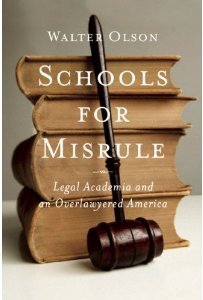The lad won 7,500 euros for being wrongly accused of stealing a bag of snacks in a store. The settlement also covered his claim of having been falsely imprisoned and assaulted when a shop worker grabbed his arm. [Irish Times]
Archive for July, 2010
“Good Lord, people are complaining because they can’t see a taco, get a life”
Much reaction in the comments at the San Francisco Chronicle to the Ninth Circuit’s “Chipotle Experience discriminates against the disabled” ruling. Earlier here. And Ted at PoL notes this significant passage rejected by the appeals court:
The [district] court found that Antoninetti had failed to show irreparable injury because he had not revisited either restaurant after Chipotle adopted its written policy and because his “purported desire to return to the [r]estaurants is neither concrete nor sincere or supported by the facts.” It also stated that Antoninetti’s “history as a plaintiff in accessibility litigation supports this Court’s finding that his purported desire to return to the [r]estaurants is not sincere. Since immigrating to the United States in 1991, Plaintiff has sued over twenty business entities for alleged accessibility violations, and, in all (but one) of those cases, he never returned to the establishment he sued after settling the case and obtaining a cash payment.”
More on ADA filing mills here. And I’ve now got a longer post up at Cato at Liberty comparing the policy problem of serial ADA complaints to that of patent trollery, mass filing of “citizen suits”, and the business model of recently formed copyright-holder RightHaven. More: Carl Horowitz, NLPC.
Schools for Misrule cover art
Just out from Encounter Books, the cover art for my forthcoming book:

Apropos of which, one theme the book treats at length — the consequences and possible origins of today’s overwhelming liberal/Left ideological dominance in academic law — is the subject of Above the Law’s latest odd-trio matchup of Richard Epstein (at Ricochet), John Yoo (in comments there) and Elizabeth Wurtzel (on Twitter). Epstein:
…on average I would say that there are more left-wing democrats than center-left democrats [in legal academia]. I define the difference as follows. The former are those who have sympathy for programs of redistribution on such key areas as education and health care, but are by and large supportive of market institutions on the production side of the line. There is an effort to make good on the earlier social democratic tradition. The left democrats are in favor of a larger public sector and are deeply suspicious of markets more or less across the board. To put the point most vividly, the center left group is uncomfortable that Obama is too far to the left. The left liberal group is uncomfortable that he is too far to the right. There is a lot of difference there.
Yoo:
…conservatives, for good reason, tend to hide their political beliefs when they are on the job market and when they are untenured. They suspect, perhaps reasonably in light of this study, that there is a bias against them. I know conservatives at other schools who try to avoid writing on anything remotely controversial — this is bad for scholarship and teaching, because it discourages our best minds and fullest debates on the most important subjects.
Wurtzel:
Re liberal bias in academia: Shouldn’t the fact that intellectuals tend to be drawn to liberal ideas tell us that liberal ideas are smarter?
Well, no, as Hayek and many others have noted, it might just be that liberal/Left ideas unlike conservative ideas flatter intellectuals with the assurance that they deserve to run the world. Certainly — as I argue at more length in the new book — many of the liberal/Left ideas in circulation today promise to make legal academics a much more powerful and influential bunch.
“Apple Sued Because iPad Does Not Work ‘Just Like A Book’ As Claimed”
What, no dustjacket? The suit claims that the way the iPad turns off to avoid overheating, which can happen outdoors in direct sunlight, makes its user experience not “just like a book”. [Chris Walters, Consumerist]
NYT: Roberts Court “most conservative in decades”
Ilya Shapiro sees some heroic simplification — at the least — going on in that sweeping assertion.
“Warning: Sharp Thing May Cut Hand”
A product liability action filed in San Francisco alleges that “defendants failed to warn the plaintiff that playing with a sharp sword displayed in its store would result in the plaintiff slicing his hand when he attempted to place it back in its sheath.” [Kevin Underhill, Lowering the Bar](& welcome Bainbridge readers)
The Mississippi emails, cont’d
If Attorney General Jim Hood wanted to avoid the impression that he was thick with the Scruggs crowd, he probably shouldn’t have had them vet his response to the Wall Street Journal before he sent it off. [David Rossmiller, earlier]
Panel: “Union influence on public policy”
At Cato today at noon, with John Fund, Armand Thieblot, John Samples, and moderator Chris Edwards, and watchable online. Wish I could attend, but I’m not in Washington at the moment.
Passenger sues over crying toddler on flight
Qantas settled the American passenger’s complaint, so we never got to hear the battle of the experts about whether the 3-year-old’s screaming really caused blood to issue from her eardrum as alleged. [Suzanne Murray/CafeMom via Stoll and many readers]
Slowing down the copyright trolls
How to respond to the emergence of assembly-line copyright-suit filers without undermining the right of content owners to stop unauthorized reprints that go beyond fair use? Max Kennerly raises the possibility of steering rights owners into agency complaints or arbitration as an alternative, or at least precondition, to court action. That might slow down the business model of groups like RightHaven, which has demanded in terrorem sums from mom-and-pop bloggers and other infringers and even asked courts to order seizure of the domains of otherwise legitimate target websites.
